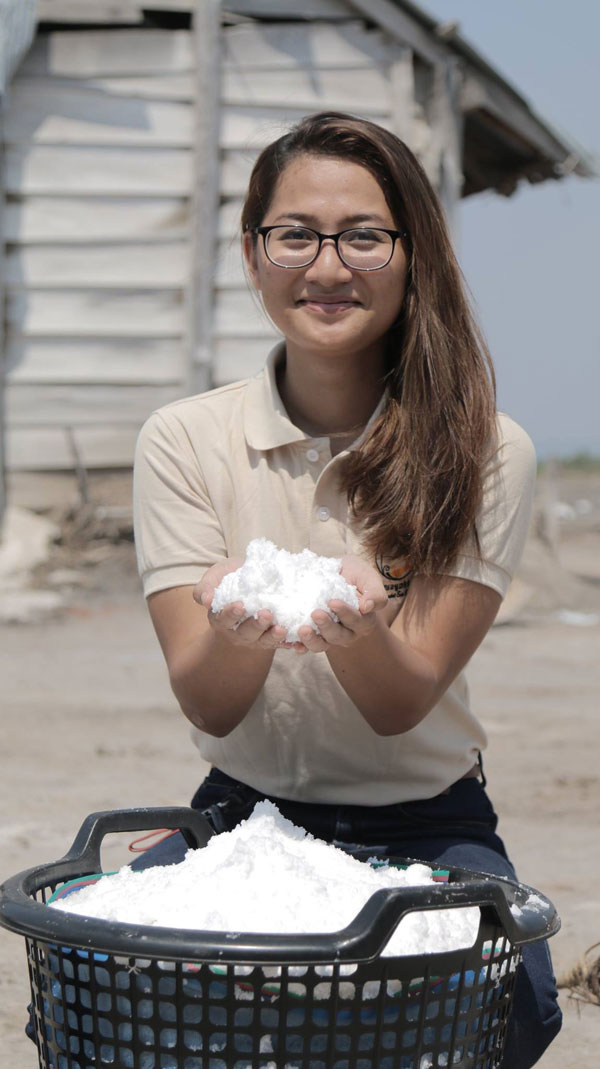
Thaung Thyda (fourth left) with members of her team. PHOTOS SUPPLIED
From humble beginnings, Kampot salt farmer Thaung Thyda has turned her family business into a thriving enterprise, serving as an inspirational role model for aspiring female entrepreneurs after transforming a traditional practice into a 21st century endeavour.
The story of Thaung Enterprise, which Thyda set up in 2016, is a remarkable account of resilience and drive, reflecting one strong woman’s determination to overcome all challenges and setbacks.
With her innovative sustainable supply chain ecosystem, Thyda has changed the nature of the Kingdom’s salt production, supporting farmers and the local community, and shifting perceptions of Cambodia internationally.
This has seen Thaung Enterprise open up markets in Europe, North America and Japan for its range of high quality artisanal products, which includes Kampot Sea Salt, Kampot Refined Salt and Fleur de Sel de Kampot.

Thaung Thyda is the third generation of salt farmer in her family. PHOTOS SUPPLIED
Thyda’s passion, dedication and commitment to quality stems from her background as a third generation salt farmer, with her grandparents beginning the practice in their humble village in Kampot province.
“My desire was to create a sustainable supply chain ecosystem because I have seen the salt sector in Cambodia face numerous challenges, with many people leaving the industry, selling their land and ceasing salt production.
“But if we stop producing salt then we lose an traditional tradition, so I wanted to help the local farmers and comm-unity by increasing their incomes and improving their livelihoods.
“I also wanted to raise the image of Cambodia internationally other than just Angkor Wat and the Khmer Rouge, and now people across the world are discovering Cambodia through quality products made in the Kingdom,” Thyda said.
Thyda says her supply chain ecosystem utilises a combination of the traditional and the modern to guarantee the best of Cambodian products internationally.
“We still focus on traditional farming methods, but we support our farmers technically to produce better in terms of quality, quantity and hygiene to ensure market demand.
“And some of these approaches also apply to farming, helping reduce production costs and achieve better results regarding product.
“While for processing, our model is of course more focused on technology – with drying, grading and sorting machines, as well as a laboratory to ensure the quality and safety of the finished product, from the raw material to final packaging.
“Parallel with our marketing, branding and design, and other international market linkages, these were the processes we believed would work best for our supply chain model,” Thyda said.
She says convincing her fellow salt farmers of the advantages of taking a modern business approach to the traditional practice was among the initial challenges she had to overcome.

Salt farming is a traditional practice in Cambodia, mostly carried out in Kampot province. PHOTOS SUPPLIED
“In the beginning, there were many challenges because it was a new business model, transforming from a traditional family business into a business with a new structure, new procedures, new standards.
“So I had to explain the new ways of operating to the farmers so they would collaborate with us, to make them understand how to produce a good quality product that adheres to modern standards.
“It took time, but Thaung Enterprise has now expanded to include some 30 members working together as natural artisan salt producers in the Kampot region,” she explained.
Business acumen
On her inspiring journey of transformation and growth, Thyda’s determination to succeed has seen her earn a number of qualifications, before becoming a lecturer herself – and a strong woman entrepreneur.
“I am not from a wealthy family, so I needed to study and cultivate a business mindset, learn from experience and have high levels of self-motivation,” Thyda said.
As a result, she enthusiastically embraced education, graduating with a master’s degree in Public Administration at the Royal University of Law and Economics, and earning a diploma from France’s Ecole Nationale d’Administration.

Thaung Enterprise’s production process ensures the highest standards. PHOTOS SUPPLIED
As well as being a lecturer at NUM International College in International Business, she is also the Terra-Madre delegate from Cambodia under the Slow Food Foundation.
Her business acumen has seen her take numerous accolades, winning the first Cambodian Young Women Entrepreneur Award in 2018, and the inaugural Cambodian National Entrepreneur Award in 2020.
Thyda says she wants her journey and the story of Thaung Enterprise to encourage young entrepreneurs to grasp all chances for developing their venture – and enhance the Kingdom’s reputation internationally.
“We have built a community where our farmers are motivated to create the highest quality products for not only the local but the international markets. This gives them a higher income to support their families for a better life and in turn raises the profile of Cambodian-made products.
“And having improved the livelihoods of our farmers, we want to encourage others, particularly young female entrepreneurs, with the message that by bettering themselves and succeeding, they will at the same time improve the image of Cambodia.
“Our mission is to inspire local producers, farmers and the younger generation to seize all opportunities and do what they can to contribute to the wider community and the nation, contributing to the growth of our economy and the advancement of our nation,” Thyda said.












